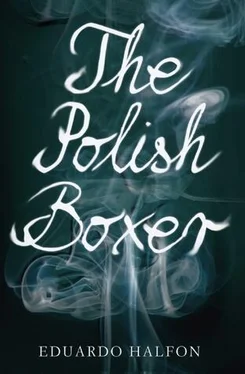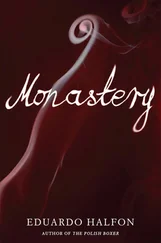Eduardo Halfon - The Polish Boxer
Здесь есть возможность читать онлайн «Eduardo Halfon - The Polish Boxer» весь текст электронной книги совершенно бесплатно (целиком полную версию без сокращений). В некоторых случаях можно слушать аудио, скачать через торрент в формате fb2 и присутствует краткое содержание. Год выпуска: 2012, Издательство: Bellevue Literary Press, Жанр: Современная проза, на английском языке. Описание произведения, (предисловие) а так же отзывы посетителей доступны на портале библиотеки ЛибКат.
- Название:The Polish Boxer
- Автор:
- Издательство:Bellevue Literary Press
- Жанр:
- Год:2012
- ISBN:нет данных
- Рейтинг книги:4 / 5. Голосов: 1
-
Избранное:Добавить в избранное
- Отзывы:
-
Ваша оценка:
- 80
- 1
- 2
- 3
- 4
- 5
The Polish Boxer: краткое содержание, описание и аннотация
Предлагаем к чтению аннотацию, описание, краткое содержание или предисловие (зависит от того, что написал сам автор книги «The Polish Boxer»). Если вы не нашли необходимую информацию о книге — напишите в комментариях, мы постараемся отыскать её.
marks the debut of a major new Latin American voice in English.
The Polish Boxer — читать онлайн бесплатно полную книгу (весь текст) целиком
Ниже представлен текст книги, разбитый по страницам. Система сохранения места последней прочитанной страницы, позволяет с удобством читать онлайн бесплатно книгу «The Polish Boxer», без необходимости каждый раз заново искать на чём Вы остановились. Поставьте закладку, и сможете в любой момент перейти на страницу, на которой закончили чтение.
Интервал:
Закладка:
Milan was looking at me angrily, or at least it seemed that way: about to throw beer in my face and roar Serbian insults or perhaps burst into tears. I served myself a mountain of white rice and began covering it with big ladlefuls of spicy pepián.
Do you know what my father does? he asked me, sitting back and crossing his arms, looking like a great leader who doesn’t know he’s been overthrown. He was clearly nervous. I put my spoon down and sat staring at him. He’s an accordionist, he said. I’m the son of a Gypsy accordionist, he said, and finished his beer. Waiter, he called, lifting his bottle, two more. He smiled ironically. And your mother? I asked. He shook his head with an air of shame or bitterness. Only my father is a Gypsy. Not my mother. I look more like her, I mean, my features are more Serbian than Gypsy. I didn’t say anything. I didn’t know what to say. For as long as I can remember my father has fought to keep me as far away as possible from both his world and his music, to keep them from me. But, like you said yesterday about jazz, I’ve got Gypsy music deep in my gonads. I could have sworn, given the menace in the way he said it, that Milan was grabbing or at least stroking his gonads under the table. I never bring any Liszt CDs on any of my trips, no Chopin, no Rachmaninoff. But I can’t go a single day, Eduardito, without hearing a bit of Gypsy music, a bit of Boban Marković, or Oláh Vince, or the legendary Šaban Bajramović. He smiled. Deep down, I’m a nomad, like them, even if my father wants to deny it. And a nomad doesn’t much like boundaries. Ah, he said to the waiter, thanks very much, and took a sip of beer. Imagine, he went on, as if gripped by some terrible inertia. I’ve been sitting at the piano for twenty-five years, studying with the best classical teachers in the best schools in the world, and all I dream about is being among Gypsies, playing and dancing and feeling the pain of their music. Ridiculous, isn’t it? Milan began serving himself generous spoonfuls of pepián and caquic, and I, considering him brave to attempt such a mixture, could only think about how some people flee their ancestors, while others yearn for them, almost viscerally; how a few run from their fathers’ world, while others clamor for it, cry out for it; how I couldn’t get far enough away from Judaism, while Milan would never be close enough to the Gypsies. And your father? I asked, sensing the answer. He doesn’t know, he said without looking up, his gaze lost in pieces of carrots and squash and goodness knows what else. He can’t know. Milan cut a chunk out of one of the little chipilín tamales with his fork and then, as if I were some watered-down version of his father, confessed: I want to give up classical music. Neither of us said a word, and we finished the food and the beers in that drawn-out silence, exhausted by all the talk, or maybe just allowing all those words to finally find their mark.
We ordered flan and coffee. Suddenly — I don’t know whether out of sincerity or impertinence — I said I wanted to know more about Gypsies, about their music, and Milan just said sure, with a disdainful flick of his head. How did you get on last night? I asked. And lighting a cigarette and raising his eyebrows with the mischievous air of a teenage troubadour, he asked me if all Mayan girls liked to fuck standing up.
White Smoke
When I met her in a Scottish bar, after I don’t know how many beers and almost an entire pack of unfiltered Camels, she told me that she liked it when men bit her nipples, and hard.
It wasn’t actually a Scottish bar, just some old bar in Antigua, Guatemala, that only served beer and was called (or was referred to as) the Scottish bar. I was drinking a Moza at the counter. I prefer dark beer. It makes me think of old-fashioned taverns and sword fights. I lit a cigarette and she asked me in English, sitting on a stool to my right, if I’d give her one. I guessed from her accent that she was Israeli. Bevakasha, I said to her, which means you’re welcome in Hebrew, and I held out the box of matches. She got friendly right away. She said something to me in Hebrew that I didn’t understand and I clarified that I really remembered only three or four words and a random prayer or two and maybe how to count to ten. Fifteen, if I really tried. I live in the capital, I told her in Spanish, to show that I wasn’t an American, and she admitted that she was confused because she hadn’t imagined there were any Jewish Guatemalans. I’m not Jewish anymore, I said, smiling at her, I retired. What do you mean you’re not? That’s impossible, she yelled in that way Israelis have of yelling. She turned toward me. She was wearing a thin white Indian-style cotton blouse, torn jeans, and yellow espadrilles. Her hair was dark brown and she had emerald blue eyes, if emerald blue even exists. She explained to me that she had recently finished her military service, that she was traveling around Central America with her friend, and that they had decided to stay in Antigua for a few weeks to take Spanish classes and make a little money. With her, she said, pointing to show me. Yael. Her friend, a pale, serious girl with exquisite shoulders, had served me the beer. I greeted her while they spoke in Hebrew, laughing, and I thought I heard them mention the number seven at one point, but I’m not sure why. A German couple came in and her friend went to serve them. She grabbed my hand firmly, told me it was a pleasure to meet me, that her name was Tamara, and then took another one of my cigarettes, this time without asking.
I ordered a second beer and Yael brought us two Mozas and a plate of chips. She stayed where she was, standing in front of us. I asked Tamara her last name. I remember that it was Russian. Halfon is Lebanese, I said, but my mother’s last name, Tenenbaum, is Polish, from Łódź, and both girls shrieked. It turned out that Yael’s last name was also Tenenbaum, and while she verified it on my driver’s license, I started to think about the remote possibility that we were related, and I imagined a novel about two Polish siblings who thought their entire family had been exterminated but who all of a sudden find each other after sixty years apart, thanks to the grandchildren, a Guatemalan writer and an Israeli hippie, who meet by chance in a Scottish bar that isn’t even Scottish in Antigua, Guatemala. Yael got a liter of cheap beer and filled three glasses. Tamara gave me my license back and the three of us drank a toast to us, to them, to the Poles. We stayed silent, listening to an old Bob Marley song and contemplating the immense smallness of the planet.
Tamara picked up my lit cigarette from the ashtray, took a long drag, and asked me what I did for a living. I told her seriously that I was a pediatrician and a professional liar. She raised her hand like a stop sign. I liked her hand a lot, and I don’t know why, but I remembered a line of poetry by e. e. cummings that Woody Allen quotes in one of his movies about infidelity. Nobody, I told her while I trapped her hand like a pale and fragile butterfly, not even the rain, has such small hands. Tamara smiled, told me that her parents were doctors and that she also wrote poems once in a while, and I supposed that she had attributed e. e. cummings’s line to me, but I didn’t feel like correcting her. And she didn’t let go of my hand.
Yael filled our glasses while I clumsily smoked with my left hand and they spoke in Hebrew. What happened? I asked Tamara, and with a sorrowful pout she told me that the day before someone had robbed her. She sighed. I walked all morning, through the artisan market, by some ruins, everywhere, and when I sat down on a bench in the central park (that’s what the Antiguans call it, even though it’s really a square), I realized that someone had cut my bag with a knife. She explained to me that she had lost some money and some papers. Yael said something in Hebrew and they both laughed. What? I asked, curious, but they kept laughing and speaking in Hebrew. I squeezed Tamara’s hand and she remembered that I was there and told me that the money didn’t matter as much as the papers. I asked her what papers they were. She smiled enigmatically, like a Dutch tulip seller. Four hits of acid, she murmured in her poor Spanish. I took a drink of beer. You like acid? she asked me, and I told her that I didn’t know, that I had never tried it. Tamara, euphoric, in her element, talked to me for ten or twenty minutes about how necessary acid is to open our minds and make us more tolerant and peaceful people, and the only thing I could think about while she chattered on was ripping her clothes off right there, in front of Yael and the German couple and any other Scottish voyeur who might want to spy on us. In order to stop her and also to relax a little, I suppose, I lit a cigarette and held it out to her. The first time I tried acid, she said while we passed the cigarette back and forth, was with my friends in Tel Aviv, and I got all sleepy, and very, very relaxed, and I think I saw God. I seem to remember that she said Dios, in Spanish, although she also could have said Hashem or God or maybe G — d, the way Jewish people write God so as not to take his name in vain — in case they rip the paper it’s written on, I guess. I didn’t know if I should laugh and so I just asked her what God’s face looked like. He didn’t have a face, she replied. So what did you see? She told me that it was difficult to explain, and then she closed her eyes, taking on a mystical air, waiting for some divine revelation. I don’t believe in God, I told her, waking her from her trance, but I do talk to him every day. She got serious. You don’t consider yourself a Jew and you don’t believe in God? she asked me reproachfully, and I just shrugged and said what for, and then went to the bathroom without giving any more time to such a useless topic.
Читать дальшеИнтервал:
Закладка:
Похожие книги на «The Polish Boxer»
Представляем Вашему вниманию похожие книги на «The Polish Boxer» списком для выбора. Мы отобрали схожую по названию и смыслу литературу в надежде предоставить читателям больше вариантов отыскать новые, интересные, ещё непрочитанные произведения.
Обсуждение, отзывы о книге «The Polish Boxer» и просто собственные мнения читателей. Оставьте ваши комментарии, напишите, что Вы думаете о произведении, его смысле или главных героях. Укажите что конкретно понравилось, а что нет, и почему Вы так считаете.












